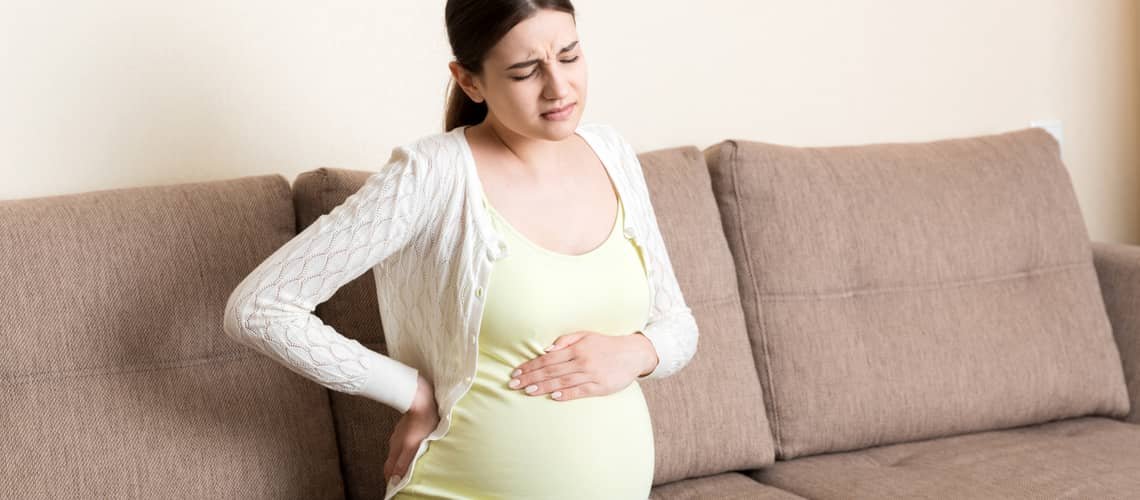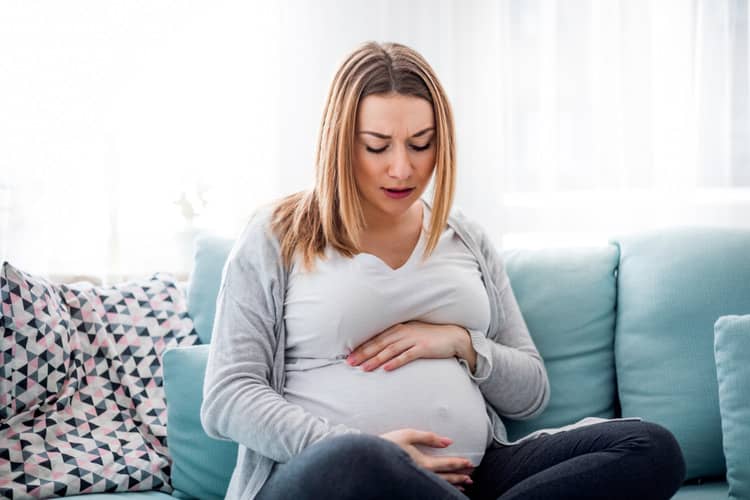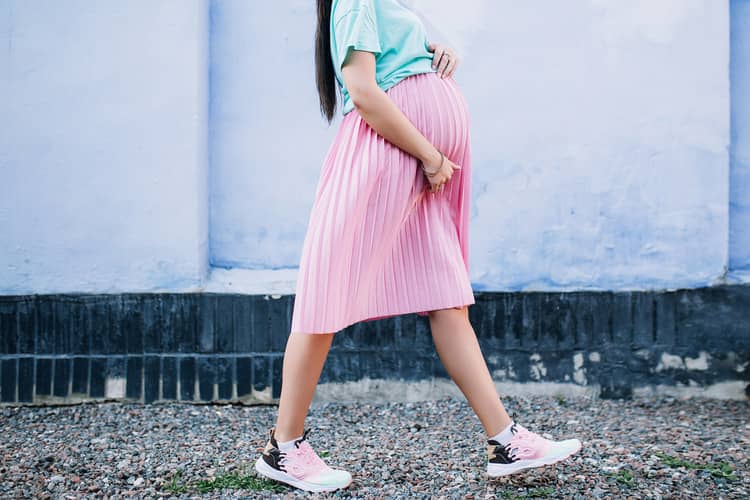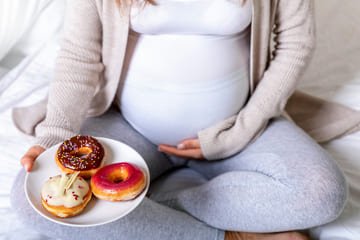
Constipation in pregnancy. Which helps with severe and painful constipation
Pregnancy is accompanied by many emotions - joy, anticipation, fear and worry. In addition to emotional fluctuations, there are also hormonal changes that have a significant impact on the metabolism and female digestive organs. The natural movements of the digestive system are reduced, the slowing down of intestinal peristalsis is the cause of constipation in pregnancy. However, the growing uterus also takes part in it, which slowly presses on the intestines and rectum.
Constipation is one of the more unpleasant symptoms of pregnancy. Almost every pregnant woman will encounter it, even those who did not have any digestive problems before pregnancy. What are the causes of constipation and what helps with constipation in pregnancy?
Causes of constipation in pregnancy
You can encounter constipation already in the first trimester, but it appears more often in the later stages of pregnancy. The main cause is the pressure of the developing fetus on the stomach, intestines and rectum. The growing uterus displaces the intestine, changes its position and it does not work normally. By slowing down the intestinal peristalsis, more water is absorbed from the diet, which is why the stool is thicker than usual. Constipation can also be caused by reduced secretion of the stomach and increased production of progesterone, which affects the muscles of the uterus and the wall of the large intestine. Its function is thus impaired.
During pregnancy, the diet often changes, women often try to live healthier, but sometimes pregnancy cravings appear and they suddenly start consuming foods that they avoided before. If the change in diet is too significant, it can negatively affect digestion.
Psychological stress, mood swings, but also insufficient fluid intake and lack of exercise have an adverse effect on pregnancy. All of these can cause constipation.

Constipation in pregnancy - manifestations
Someone visits the toilet once a day, someone twice a day, someone goes to the toilet only once every 2-3 days without having any difficulties. Symptoms of constipation are individual for each pregnant woman, sometimes stool may not appear for several days and this does not mean that it is constipation. It is especially important how the woman feels and whether she feels a significant difference compared to the bowel movement before pregnancy.
Typical symptoms of constipation are less frequent bowel movements, hard stools in smaller amounts, feelings of incomplete emptying and bloating.
What about constipation in pregnancy
Of course, you can help with constipation with medications if they are allowed during pregnancy, but since a new life is growing inside you, you should choose less invasive means first. First of all, it is important to change your diet, get enough exercise, and only as a last resort should you turn to medication.

Menu for constipation
Diet is closely related to digestion, and not only during pregnancy, proper nutrition can help with many problems. Pregnant women should include in their diet substances that support bowel movement and help with emptying. Of course, they should leave out substances that cause constipation and bloating. The first step to the treatment and prevention of constipation is to increase fiber intake. Her daily intake should be 30 g. Higher consumption of fruits, vegetables and regular consumption of whole grain products are helpful in increasing the fiber content in the diet. The right amount of fiber has a positive effect on stool stiffness, shortens the passage of food through the intestine and improves bowel activity - thus having a positive effect on constipation during pregnancy.
Emptying is facilitated by soups, raw vegetables and fruits (especially apples, pears, plums, apricots, peaches, grapes, dates and figs), sauerkraut, sauerkraut juice, dried fruits, buckwheat, oatmeal, cereals, lean meat, poultry and fish, bread containing bran. Fried and fatty foods, sweet and salty foods, white rice, white bread, onions, garlic, spinach, chocolate and coffee should be avoided.
During pregnancy, it is necessary to take enough fluids, it is recommended to drink about 2 liters a day. Food should be divided into smaller portions and consumed more often, 4-5 times a day. The time between meals should not exceed 4 hours. You should eat slowly, you should chew the food thoroughly and swallow often, so it is easier to process in the intestines.
Enough movement
Lack of exercise causes, among other things, a slowdown in digestion, so it can be the cause of constipation. Exercising for pregnant women is a way to get rid of back, butt and leg pain, stay in good shape until childbirth and also a way to move the bowels. You can exercise in every trimester, of course, the exercises must be adapted to your health condition. Yoga, pilates, walking, swimming or group exercises for pregnant women are suitable.

Medicines for constipation
If a change in diet or exercise did not help, do not try to self-solve constipation with medication. Always consult a doctor about their use, as many contain substances that contribute to the strengthening of the wall of the large intestine, but also to the tension of the uterus. This can result in inducing contractions and premature labor.
Glycerin suppositories are suitable during pregnancy, because they act only locally on the intestine and do not affect the tension of the uterus. They contain glycerol, which is the answer to the question "how to soften the stool". It is a gentle laxative that binds water, softens the volume of the stool, leaves an oily film on the walls of the intestine, which increases the sliding of the stool. You should consult your doctor about the use of glycerin suppositories, he can also prescribe a suitable product.
Better forget about pushing stool during pregnancy
Bowel problems can be a bigger problem during pregnancy than just the occasional hard stool. There are bacteria and various microorganisms in the large intestine, inflammations can occur when peristalsis is slowed down to a complete stoppage of stool. Occasional strong pressure on the stool is not a problem, if you press on the stool regularly, damage to the intestinal wall and rectum can occur. Prolonged hard stools can result in hemorrhoids, or worse, premature birth. Damage to the anus causes pain, which often leads to an unconscious delay in defecating. This makes the whole situation worse, because when you finally decide to have a big bowel movement, persistent pushing can cause amniotic fluid to flow out, induce contractions and give birth prematurely.

Constipation in pregnancy - experience
Expectant mothers have a lot of experience with constipation during pregnancy. They especially recommend exercise and certain foods that have moved their bowels. When moving, swaying in the hips is suitable, in the morning water with lemon, warm water on an empty stomach or fruit juices can help. Pears, sauerkraut or juice from it, as well as consumption of white yogurts with fiber, helped several people with constipation. Psyllium, dried plums, glycerin suppositories or Duphalac syrup, which is suitable for pregnant and lactating women, have also proven themselves.
The most frequent questions - FAQ
Constipation is a common problem during pregnancy, many women encounter it. Long-term constipation and hard stools can cause problems, so you need to deal with bowel problems as soon as they appear. What is your experience with constipation in pregnancy? Do you want to ask us something about that topic? Tell us what interests you in the comments.
Is an enema suitable for constipation during pregnancy?
Is yogurt good for constipation?
Do vitamins for pregnant women affect constipation?
Can I use commonly available laxatives and laxatives during pregnancy?
Pridať komentár






